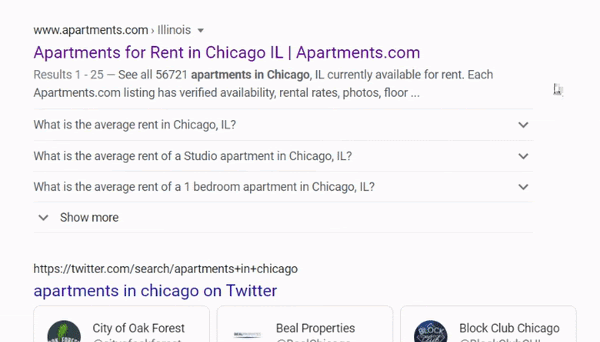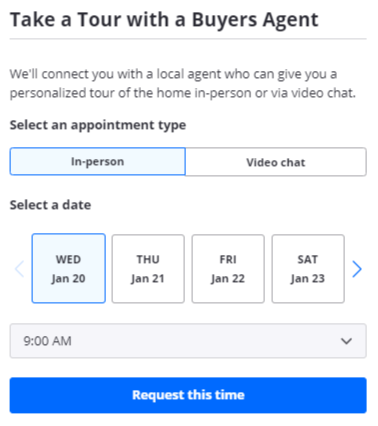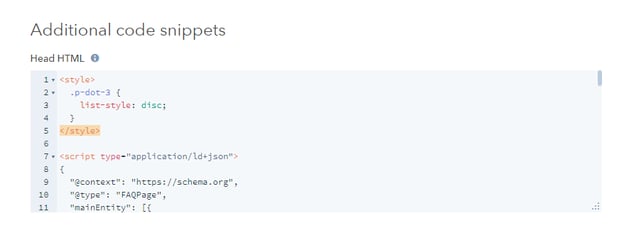The real estate industry has seen tumultuous changes as a result of the COVID-19 pandemic.
Take buying a home: what was once an in-person experience has shifted to the digital world with virtual tours and online open house confirmations.
A study from the National Association of REALTORs shows that 95% of home buyers use the internet to search for homes.
These changes to the industry also mean changes to how you approach real estate SEO.
You need to position your content in front of the potential client to close the sale and win their business — all when online competition is at an all-time high.
One simple, invaluable way to win search visibility and win the sale is with schema markup.
What is Schema?
SEO schema, or structured data, is an online language of sorts, that helps Google and other search engines further understand the contents of your site.
There is a benefit to the end users’ experience, too: schema can result in rich snippets on the SERP, which makes the search listing more appealing, visual, and valuable.
For example, this search listing, which ranks for the keyword query apartments in Chicago, features the FAQ schema.

(Question-and-answer drop-downs can appear in the Google search results.)
This schema type allows the site owners to answer commonly asked questions directly on the SERP (and earn more search visibility while doing so).
Strategies for Real Estate SEO
Before I explain the schema markup types applicable to property listings, I’d like to share a few SEO strategies that you can integrate into your SEO strategy.
Create a Mortgage Calculator
Adding a mortgage calculator to your Google Business Profile profile offers value in a personalized and interactive way on the SERPs.
Secure the Answer Box
It’s also worthwhile to create content aimed at securing the Featured Snippet. This is a great way to capture search visibility at the top of the search results page.
Here's a helpful post that shares more strategies and optimization tactics: Scaling Real Estate SEO for Large Home Sale and Rental Listings.
How to Use Structured Data on Real Estate Sites
SEOs who work in the real estate industry have an advantage over others: there are specific schema types hosted on schema.org that are relevant only to the real estate industry.
RealEstateListing
The RealEstateListing schema is applicable to real estate offers with the goal of leasing or selling. Its information represents the entire listing, whereas other schema focus on one particular section of the listing.
The properties of the RealEstateListing include:
- datePosted
- leaseLength
LeaseLength
The LeaseLength schema (set as a duration or a quantitative value) indicates the length of a lease for an accommodation, offer, or RealEstateLisitng.
Here’s a look at a JSON-LD HTML code example from schema.org:
},
"leaseLength": {
"@type": "QuantitativeValue",
"value": 6,
"unitText": "months"
},
SingleFamilyResidence
The SingleFamilyResidence schema offers information about a single-family property.
It lives within the hierarchy of Thing > Place > Accommodation > House > SingleFamilyResidence.
Properties of this schema type include:
- numberOfRooms
- Occupancy
Other properties are available for the House, Accomodation, Place, and Thing elements.
Schema.org offers the following code for a SingleFamilyResidence schema, with multiple additional properties:
<script type="application/ld+json">
{
"@context": "https://schema.org",
"@type": "SingleFamilyResidence",
"name": "1331 St George Street - Family House",
"description": "Great opportunity to own this 2500 sqft originally built in 1988 family home with 4 bedroom, 3 bathroom. which was RENOVATED IN 2014:( New Windows, New Bathroom, New Hardwood Floors, Air Condition, New Kitchen, etc.)",
"numberOfRooms": 5,
"occupancy": {
"@type": "QuantitativeValue",
"minValue": 1,
"maxValue": 5
},
"floorSize": {
"@type": "QuantitativeValue",
"value": 2500,
"unitCode": "FTK"
},
"leaseLength": {
"@type": "QuantitativeValue",
"value": 6,
"unitText": "months"
},
"numberOfBathroomsTotal": 3,
"numberOfBedrooms": 4,
"permittedUsage": "Perfectly suitable for a family with two kids.",
"petsAllowed": "Only cats are allowed",
"yearBuilt": 1988,
"address": {
"@type": "PostalAddress",
"addressCountry": "CA",
"addressLocality": "Vancouver",
"addressRegion": "British Columbia",
"postalCode": "V5T 1Z7",
"streetAddress": "1331 St George Street"
},
"telephone": "+1-604-829-6070"
}
</script>
Video Schema
Although not created solely for the real estate industry, the video schema allows you to present video content as a virtual tour link on the Google SERPs, so users know that your web page has valuable, in-depth information about the property listing.

(These property listings offer virtual tours.)
This is especially valuable during times when social contact is at a minimum due to the pandemic.
Event Schema
The event schema can be used to highlight 3D property tours and open house availabilities.
Here, we see a real estate company promote their 3D walkthroughs:

(Prospects can see online 3D tours of these homes.)
And the same company shows open house appointment slots:

(The event schema can show open house time slots.)
A potential buyer or renter may be more interested in a property that they know they can see in person.
These active links lead to an information page about the property, with the ability to book an in-person meeting or video chat:

(Customers can book an appointment with an agent online.)
Other Real Estate Schema Markups to Consider
Real estate companies and real estate agents should take advantage of other more common schema types as well to inform the search engines about their pages and give searchers a more enhanced online experience.
Recommended Reading: Types of Schema Markup in SEO: Picking the Right Structured Data
Organization Schema
The organization schema allows you to showcase information relevant to your business, such as the address, logo, phone number, and reviews.
All of this information comes together to form a Google Knowledge Panel on the side of the SERPs, as we see here:

(Highlight your local business information with a Google Knowledge Graph.)
You can also add information such as the opening hours and forms of payment accepted with the LocalBusiness schema.
The LocalBusiness schema lives within the organization schema, with the hierarchy of Thing > Organization > LocalBusiness.
FAQ Schema
As we saw with the original schema example up above, the FAQ schema for frequently asked questions often creates an interactive question and answer box directly on the SERPs.
This display not only enlarges your SERP listing (which pushes any competitor below you even further down) but can improve your search visibility and click-through rate.
Read about what we found after running an FAQ schema CTR test — and consider replicating the test yourself.
How to Add Schema to Your Real Estate Listings
There are three different ways to create structured data:
1. Write the code yourself
The schema tag is a markup in the page’s HTML, so if you can write basic HTML code, you can follow the properties from schema.org and create the markup.
2. Use the JSON-LD format
The most common format of schema is JSON-LD (as opposed to the other formats: Microdata and RDFa). This, however, will still be a challenge and will require technical know-how.
3. A schema generator tool
You can override the manual process of creating schema with a schema markup generator.
Schema Builder, a free plugin from schema.dev, is one such tool. Users can create schema in minutes with a simple point-and-click interface.
Once you have your working structured data snippet, you simply add it to the respective blog post or site page.
Most content management systems allow you to do this directly in the settings page.
 (Adding schema code to a webpage.)
(Adding schema code to a webpage.)
If you don't have direct access to the CMS, or are required to go through dev to get site changes implemented, we have good news for you:
You can build, test, and deploy structured data in minutes across your site with Schema Optimizer.
Deploy schema once, and see it implemented across thousands of pages. With custom parameters and variables, you're in control of when and where schema gets deployed.
Bonus: Testing Your Structured Data
Because of common issues with structured data, you may choose to test your schema's code to ensure it's error-free. Schema.dev also offers Schema Tester — a free testing tool to confirm that your JSON code is correct.
Or, you can also use an SEO platform to audit your structured data at scale.
Conclusion
There has been a massive shift in the housing industry, pushing buyers to online avenues instead of in-person business deals.
This saturation of the digital world has created heavy competition, but where there is competition there is opportunity — and using structured data can give you the upper hand in attracting leads and closing deals.
Again, here are the schema types that real estate companies should use:
- RealEstateListing
- LeaseLength
- SingleFamilyResidence
- Video
- Event
- FAQ
- Organization
Looking for more schema markup options for different verticals? Check out our post on schema for product listings.










Comments
Currently, there are no comments. Be the first to post one!